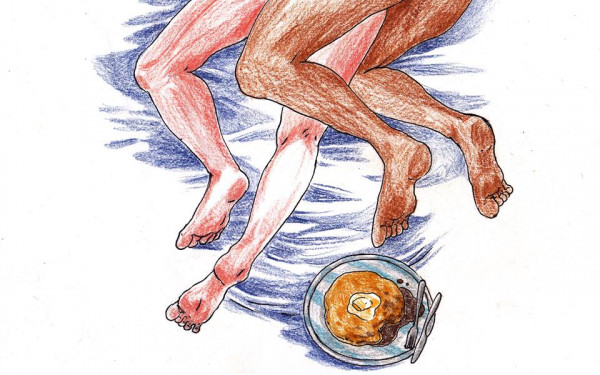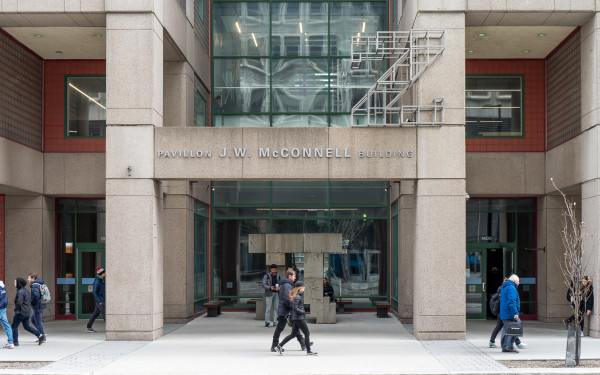Norman Nawrocki Explores Migrant Justice Through His New Album
Album Launch Prompts Conversations for Change
If there was a single word to describe Norman Nawrocki, it might be “prolific.”
Nawrocki is a poet and an author, having released 14 books in the past 30 years. He’s also a spoken-word artist and a violinist, and he and his bands have released 55 albums over the same period of time. In between putting out a constant stream of new art, Nawrocki also finds the time to teach a class at Concordia’s School of Community and Public Affairs.
His latest album, a spoken-word solo piece called Displaced / Misplaced, launched last week. The album is an 18-track exploration of themes such as migration, displacement, racism, and solidarity.
Nawrocki began working on the album last summer, when photos of migrants defiantly moving across the borders of Europe in search of sanctuary shook the world.
“I was watching the news, I was listening to the radio, I was reading reports online, I was seeing the photos,” Nawrocki said. “I thought, ‘I’ve got to write something about this.’”
Other than being one of the most salient political issues of our time, Nawrocki said that migration is also something that touches him on a personal level.
“My grandparents came from the old country—from Ukraine,” he said. “They were poor peasants, they were looking for a better life.”
“When they came here, they faced a lot of discrimination,” he explained, adding that as a child he was discouraged from announcing his Ukrainian background, for fear of prejudice. He only learned the correct pronunciation of his own family name as a young adult. It’s actually pronounced “nav-rots-kee,” but he was raised pronouncing it “now-rock-ee.”
“Obviously it’s different though, for people of colour,” Nawrocki noted, explaining that the discrimination faced by non-white migrants is “much more intense.”
Beyond the more visible forms of migration embodied by the global refugee crisis, Nawrocki also explores localized forms of displacement in his album.
“In North America—and Europe as well—there are also internal refugees, victims of the gentrification process,” Nawrocki said. “We see it in Montreal and elsewhere, poor people are being forced out of the neighbourhoods they grew up in.”
“So on the album, I also talk about homelessness, and people who are victims of the housing chaos that we call the ‘free market.’”
Beyond providing commentary on issues around migration, the album is actually a fundraiser for Montreal-based migrant justice groups. All funds raised from album sales will go to benefit two groups—Solidarity Across Borders and the Immigrant Worker Center.
Solidarity Across Borders is a grassroots group, which provides support for migrants dealing with the immigration and refugee system. The Immigrant Workers Centre is a group that supports migrants in the labour force and helps to organize against exploitative practices by employers.
Nawrocki’s goal for the projects was to “use the album to raise awareness, not just of the issues, but also of the groups that are trying to do something to help people.”
Still, his scathing political commentary found on Displaced / Misplaced isn’t a new avenue for the artist. A self-identified anarchist, Nawrocki’s artistic beginnings were simply an extension of his activism. He sees the two as mutually reinforcing.
“On the stage, I can talk about the same issues, but I can reach many more people—because I have access to radio and TV,” he said. “I can present these messages in a form that’s even more digestible for some people.”
“I was watching the news, I was listening to the radio, I was reading reports online, I was seeing the photos. I thought, ‘I’ve got to write something about this.’” —_Norman Nawrocki_
“There’s a long history of political art,” he said. “There’s a history of common people writing about their lives, singing songs […] and reaching people who respond because they identify with those experiences.” This, Nawrocki said, can help build movements that are capable of directly implementing change.
Nawrocki acknowledged that the far-right, and the anti-migrant sentiment it produces, seems to be on the rise worldwide. But he isn’t discouraged—he said that this rise in nationalism is also producing a wave of solidarity unlike any he has seen before.
“There is a silver lining in this incredibly dark cloud that’s suddenly descended,” he said, hopefully. “And this is what we have to do. And I’m hoping that my album will contribute to that kind of public discourse.”
“As an anarchist, I believe that people need to take direct action to solve the problems around us,” he continued. “And we need to support each other through mutual aid—the whole movement of support for migrants and refugees is one of mutual aid.”
Now that Displaced / Misplaced is completed, Nawrocki is working on more projects. He’s turning his most recent novel—Cazzarola, a story about anti-fascist resistance by Roma people in Italy—into a screenplay. He’s also working on a novel about the 2012 student uprising that took place in Montreal.
Nawrocki hinted that he might be reviving Bakunin’s Bum, a band he played in with the drummer from Godspeed You! Black Emperor, and he’s putting out a new album with DaZoque!, his Eastern European instrumental band.
He doesn’t see himself giving up his art, or his activism, any time soon. Now is the time, he said, when we need both more than ever.
Copies of Displaced / Misplaced can be bought for $10 at QPIRG Concordia and the offices of the Immigrant Worker Centre.

2_900_599_90.jpg)



1_600_375_90_s_c1.jpg)

__thumb_600_375_90_s_c1.JPG)